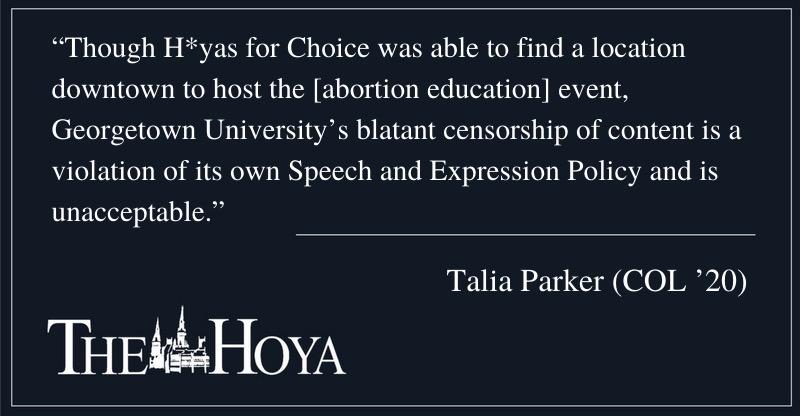On Jan. 22, 2020, Georgetown University prohibited an event hosted by H*yas for Choice from being held on campus. This action — an unequivocal violation of the Speech and Expression Policy — sets a dangerous precedent for censoring activism and organizing work at Georgetown. Students and faculty alike must unite to protect our rights on campus.
The event in question was a Papaya Workshop, an event designed to destigmatize and demystify the process of an abortion — a very common medical procedure. A papaya workshop is an educational tool meant to illustrate the procedure for nonclinical audiences using papayas as uterine models. The intention of the workshop was not to train students on how to provide abortions, but simply to demystify the process.
Two days before the event was supposed to take place, I received an email from the Center for Student Engagement informing me the room reservation for the event had been canceled and that I was being called into a meeting with CSE staff. At this meeting, we were told we could not reserve a room for our event. In an email summarizing the meeting, the CSE wrote, “The classroom reservation was not approved because consistent with the institution’s Catholic and Jesuit identity, it is not appropriate for Georgetown University classrooms to be used for the demonstration or training of abortion procedures.”
Though H*yas for Choice was able to find a location downtown to host the event, the university’s blatant censorship of content is a violation of its own Speech and Expression Policy and is unacceptable.
Georgetown’s Speech and Expression Policy explicitly states, “Restrictions shall not be placed on individual’s reserving classrooms for the purpose of limiting, managing or controlling the content of the gathering.” In canceling our room reservation to limit the content of our gathering, Georgetown undoubtedly violated this policy and infringed on our rights as students at this university.
The university claimed it canceled this event to comply with the institution’s Catholic and Jesuit identity. However, this argument is rebuffed by the existence and the content of the Speech and Expression Policy. The policy is precisely what is supposed to protect students and faculty from overbearing Catholic censorship, and the policy even states that “Georgetown’s identification with the Catholic and Jesuit tradition, far from limiting or compromising the ideal of free discourse, requires that we live up to that ideal.”
If everything on campus had to comply with the institution’s Catholic and Jesuit identity, we would not have GU Pride or the LGBTQ Center, professors would not be able to discuss contraception in class and the interreligious dialogue Georgetown so prides itself on would be moot. This freedom from censorship is the exact reason that the Speech and Expression Policy exists and why the cancellation of the Papaya Workshop is so disturbing.
From this incident, it seems as though the university currently has full discretion over which events to identify as inconsistent with university values and to subsequently censor. Nowhere in any of its policies is it stated that an educational event meant to demystify the process of abortion is prohibited — administrators simply decided to exercise their unrestricted authority over students in this particular instance. This sort of unchecked power has dangerous implications, not just for H*yas for Choice and other unrecognized organizations, but also for all community activism on campus.
Community activism has always been an integral part of life at Georgetown. It’s why we have the Just Employment Policy with the guarantee of a living wage, the LGBTQ Center and, most recently, a promise to divest from fossil fuels. All of these organizing efforts put pressure on the university to make positive changes on campus but could have been easily shut down if the university were allowed to censor the content of gatherings it didn’t like or agree with.
The university’s prohibition of a Papaya Workshop on campus was a dangerous step in the direction of suppression. If this censorship continues, the university will fundamentally alter the rights students, faculty and staff have on campus. The university must clarify the extent of its authority over student action and recommit itself to adhering to its own free speech policy. This is bigger than any one workshop. This is about the future of free speech and activism at Georgetown.
Talia Parker is a senior in the College and the president of H*yas for Choice.















Scotus • Feb 18, 2020 at 5:41 pm
“If everything on campus had to comply with the institution’s Catholic and Jesuit identity, we would not have GU Pride or the LGBTQ Center, professors would not be able to discuss contraception in class and the interreligious dialogue Georgetown so prides itself on would be moot.”
O tempora, o mores! If only Georgetown’s administration had the courage to uphold Catholic principles in all these instances, too!